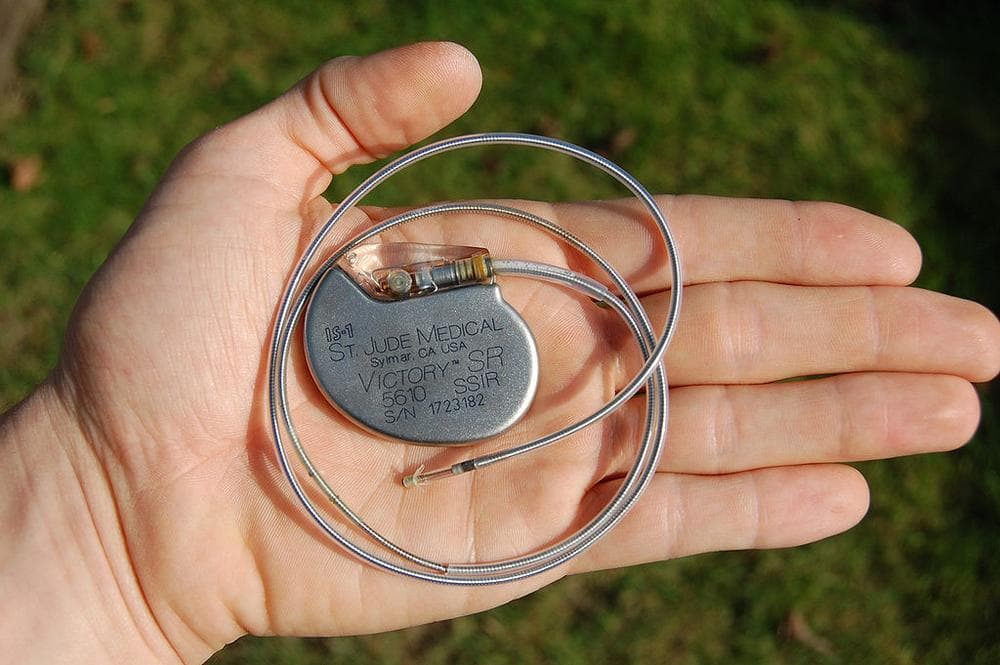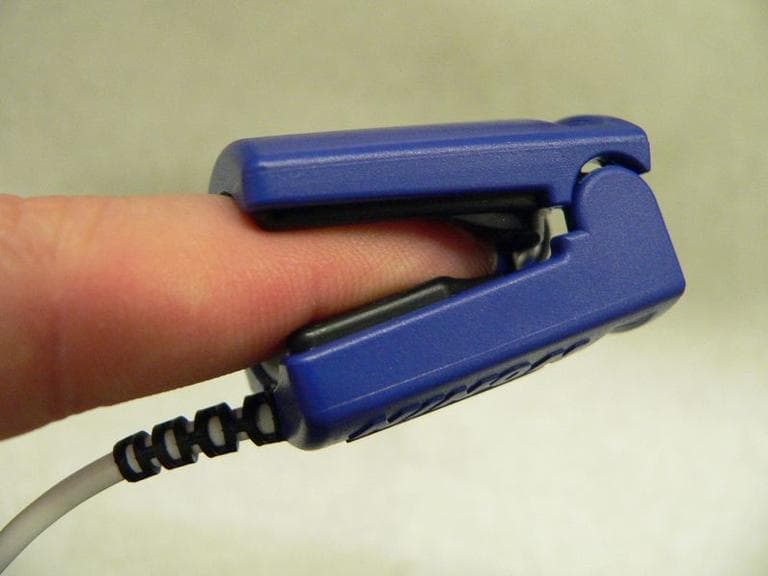Advertisement
What's All This Federal Fuss Over An Obscure Medical Device Tax?

The medical device tax, an obscure component of health reform, is suddenly in the public eye after the House of Representatives chose to attach a repeal of the tax, along with a one-year delay of Obamacare, to a Senate budget resolution to fund the federal government. The move by the House sets up a showdown that may end in the federal government being shut down until a deal can be hammered out — something that hasn't happened in nearly 20 years.
As lawmakers scramble in Washington, we turned to Brian Johnson, publisher and co-founder of MassDevice.com, an online business journal covering the medical device industry, to tell us what's up with the tax and why it's suddenly a hot-button political issue. MassDevice.com has been covering this issue for four years, speaking with lawmakers, medical device CEOs and lobbyists.
So Brian, to echo our headline, what's all this fuss about the medical device tax?
The medical device tax is a 2.3% excise tax on every sale of a medical device in the United States, except for some consumer products like contact lenses and Band-aids, which are exempt.
The levy was conceived four years ago this month as a way to pay for the Affordable Care Act and has been in place since this January of this year. It's estimated that the tax will generate about $30 billion in income for the federal government over the next ten years and, since they started making semi-monthly payments to the IRS this January, medical device companies have already paid more than $1 billion to the federal government under the tax, according to a recent report.
However, the tax also has powerful friends. In fact, it has the three most powerful friends you can get in Washington, D.C.
The tax is universally hated by the medical device industry, which has been feverishly lobbying lawmakers to get the tax knocked out, delayed or repealed outright for the better part of four years now.
The tax is also generally unpopular with lawmakers on both sides of the aisle in Washington and has actually already been repealed once by the House of Representatives as a stand-alone bill in June of 2012 by a vote of 270-146, as one of the 44 separate bills the House has passed repealing all of, or parts of Obamacare. The Senate also voted in favor of repealing the medical device tax, 79-20. However, that was a non-binding resolution, which amounts only to a symbolic show of support in the Upper Chamber.
However, the tax also has powerful friends. In fact, it has the three most powerful friends you can get in Washington, D.C. Sen. Max Baucus (D-Mont.) chairman of the Senate Finance Committee, is the father of the tax, having been in on creating the ACA in 2009; his colleague, Senate Majority Leader Harry Reid (D-NV), has no interest in bringing a repeal bill to a vote because he helped broker a deal to cut the tax in half in 2009. And the biggest backer of the tax, President Barack Obama, has promised to veto any bill containing a repeal of the medical device tax.
So is this really worth shutting the federal government down over? Don't these guys make billions of dollars a year? Why can't they just pass that 2.3% on to their customers?
Let me try and answer that by explaining why the medical device industry so hates this tax.
First, it's a tax on sales, so even companies that are losing money have to pay it. This means the tax disproportionately harms young, innovative start up companies that are building the medical technologies of the future. It takes a ton of money to bring a new medical device to market, between the regulatory hurdles at FDA and the Centers for Medicaid and Medicare Service, legal bills from protecting patents and intellectual property, manufacturing costs and challenges of building a highly specialized sales forces. Medical device companies generally don't achieve profitability until they hit at least the $100 million in sales mark (if they're lucky).
Second, the tax is costing the industry thousands of jobs. In 2012, publicly traded medical device companies cut 10,000 jobs, in part, to brace for the impact of the tax, although it's impossible to determine how much the tax actually added to those job loss numbers. Still, the amount of money that companies are paying is substantial. Massachusetts' own Boston Scientific has kicked $35 million back to the feds in the first half of the year; Mansfield, Mass.-based medical device giant Covidien has dropped $30 million; and every company has felt some pain in the wallet investing in the IT systems and tax experts necessary to comply with paying a tax on every single product you sell every two weeks.
Third, the hospital industry has made it nearly impossible to pass the tax along to them. Groups representing the hospital industry asked the IRS to write into its regulations that device companies couldn't pass on the tax to them. When that didn't happen, the hospital industry created a public shaming campaign called "Medical Device Tax Watch," a website that names any company that is passing along the tax to hospitals. The campaign is funded by the Healthcare Supply Organization, a group that represents nearly all of the hospital purchasing groups in the country, so it has been effective in keeping most medical device companies from trying to pass the buck.
Fourth, the medical device industry is generally offended that they've been singled out to pay for a health-care reform bill they don't think they'll get anything out of. The common argument among advocates of the tax has been that associated healthcare industries will see a massive boom in customers because of new enrollees into the health-care system. However, medical device makers argue that the new enrollees in health insurance plans will be young and not in need of the technology they create, such as cardiac stents, hip and knee implants and surgical devices that the industry primarily creates.
Really, they're saying they won't see any new business out of Obamacare? How can that be?

Several companies have studied their business results in Massachusetts, which is the model for the ACA and one of the only universally insured populations in the U.S., and swear they see no uptick in business.
One of the few companies to actually make its study public, Masimo, a patient monitoring company, which makes pulse oximeters (those things they put on your finger tip when you go in for surgery that measure the amount of oxygen in your blood), reported that their sales actually dropped in Massachusetts, despite a 7% influx of newly insured patients.
Unfortunately, there haven't been enough independent studies on the subject to refute the notion that there won't be any increase in sales for the medical device industry. However, it certainly won't see the kind of business uptick that pharmaceutical and health insurance companies will from the new influx of patients into the system.
How did repealing the tax become a part of this whole spending debate?
With the exception of some mixed messaging in the early days of the medical device tax, the medical device industry has really been in lock-step with its push to repeal the medical device tax outright.
AdvaMed, the chief lobbying organization for the medical device industry in Washington, has steadily increased its outreach to lawmakers on The Hill and has been well-positioned to have the ear of the GOP power base. Brett Loper, who used to run government policy at AdvaMed, left the association to become a senior policy staffer in House Speaker John Boehner's office for a couple years before moving on to American Express.
In addition, the industry has worked along with Rep. Erik Paulsen (R-Minn.) and Sen. Amy Klobuchar (D-Minn.) to help spread the work of the medical device industry in both houses of congress. Former Massachusetts senator Scott Brown was also an outspoken advocate for the industry in repealing the tax before he lost his seat to Sen. Elizabeth Warren (who also supports repealing the tax). Over time, the industry and its friends have built a solid core of support. Once they had the votes in place, AdvaMed has essentially been looking for a larger Senate bill to attach the repeal amendment onto.
Last week, AdvaMed hosted about 2,100 medical device executives in Washington, D.C. for its annual conference, and while leaders were skeptical that the device tax could be attached to the continuing resolution debate, they were hopeful they would get a chance during the upcoming debt limit talks. In addition, AdvaMed began buying large chunks of advertising in media outlets like Politico, which is widely read on Capitol Hill.
Apparently, those efforts were successful, and something accelerated those plans and the tax leapfrogged into the big time.
Isn't the medical device industry a big part of the Massachusetts economy?
Yes, the Commonwealth represents the second or third largest medical device cluster in the U.S., depending on how you measure it. Companies like Boston Scientific, Covidien, Phillips, Smith & Nephew and Zoll Medical employ tens of thousands of people in the state and the total economic output of the industry accounts for about 2.5% of the state's gross domestic product.
Massachusetts is also home to hundreds of small, start up companies developing cutting edge medical devices.
So Brian, after covering the issue for four years are you surprised to see it suddenly thrust into the national spotlight?
Yes, at MassDevice we've been on this issue for four full years now and everyone on the staff has become an expert on the subject and, honestly, we're all probably pretty sick of writing about it. However, it's one of those issues that people in the industry never seem to get sick of talking about.
It's also an issue that gives most people outside of the industry pause because it is, after all, kind of a weird concept, excise taxes are often associated with things like gasoline, diesel fuel, liquor, wine, cigarettes and airline tickets — not life saving medical equipment. I also think the jobs argument has always been a winning argument against the tax.
However, it's still a strange thing to see something like the medical device tax become a part of this much larger drama in Washington, D.C. There were times on Saturday night — sitting on my couch watching CSpan at 11 o'clock, counting votes and drinking bourbon — where I actually had to pinch myself that the federal Government could end up getting shut down over the medical device tax. Part of me was a little overcome with nostalgia thinking about the hundreds of conversations I've had with CEO's, congressmen and lobbyists over this issue. I truly feel like I had a front row seat for all of this drama.
The other part of me was just sad that I had nothing better to do than sit on my couch watching CSpan at midnight on a Saturday night.
This program aired on September 30, 2013. The audio for this program is not available.
